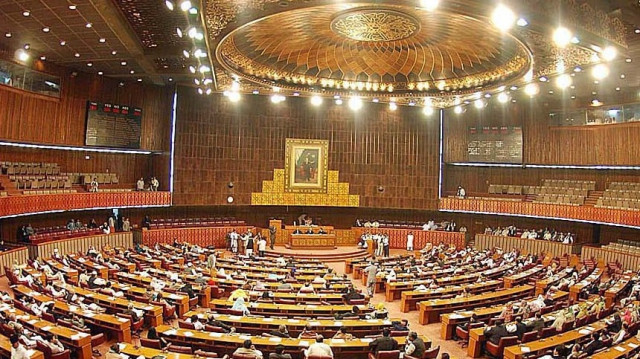Govt to debate CII reports in parliament
A summary of the body’s proposals has been forwarded to the PM and ministry.

National Assembly of Pakistan. PHOTO: APP/FILE
The government has decided to take up for debate both the reports and recommendations of the Council of Islamic Ideology (CII) in parliament.
The ministry for religious affairs has already forwarded a summary to Prime Minister Nawaz Sharif in this regard, Minister for Religious Affairs Sardar Yousaf told reporters in Islamabad.
Yousaf also indicated that his ministry was also considering a proposal about restructuring of the Council and the Ruet-e-Hilal Committee. The decision has been taken because there are some controversial reports that require parliamentary consent, an official in the ministry said.
Jamiat Ulema-e-Islam leader Maulana Akhtar Sheerani is currently heading the CII. President Asif Ali Zardari had appointed him as head of the Islamic body that guides the government on Islamic jurisprudence. The council recently held that the DNA tests in rape cases are unacceptable and should only be taken as supplementary evidence. The council also termed the process of human cloning as “illegal.”

It directed the Higher Education Commission (HEC) and other relevant institutions to rectify the English translation of “Allah,” “Rasool” and “Masjid” while terming the usage of terms, including “Holy Book” and “Holy Place” illegal. The Sheerani-led body also believes that there is nothing wrong with the blasphemy laws of the country and it doesn’t need any amendments.
Functions of the CII
As per Article 230 of the Constitution, the functions of the Islamic Council shall be: to make recommendations to the Majlis-e-Shoora (parliament) and the provincial assemblies as to the ways and means of enabling and encouraging the Muslims of Pakistan to order their lives individually and collectively in all respects in accordance with the principles and concepts of Islam as enunciated in the Holy Qur’an and Sunnah; to advise a House, a Provincial Assembly, the president or a governor on any question referred to the Council as to whether a proposed law is or is not repugnant to the injunctions of Islam; to make recommendations as to the measures for bringing existing laws into conformity with the injunctions of Islam and the stages by which such measures should be brought into effect; and to compile in a suitable form, for the guidance of Majlis-e-Shoora (parliament) and the provincial assemblies, such injunctions of Islam as can be given legislative effect.
Where a house, a provincial assembly, the President or the Governor, as the case may be, considers that, in the public interest, the making of the proposed law in relation to which the question arose should not be postponed until the advice of the Islamic Council is furnished, the law may be made before the advice is furnished: Provided that, where a law is referred for advice to the Islamic Council and the Council advises that the law is repugnant to the injunctions of Islam, the House or, as the case may be, the Provincial Assembly, the President or the Governor shall reconsider the law so made.
The Islamic Council shall submit its final report within seven years of its appointment, and shall submit an annual interim report. The report, whether interim or final, shall be laid for discussion within six months.
Published in The Express Tribune, July 14th, 2013.


















COMMENTS
Comments are moderated and generally will be posted if they are on-topic and not abusive.
For more information, please see our Comments FAQ